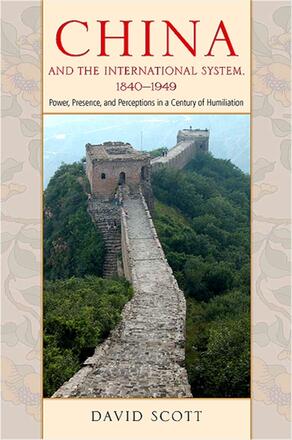
China and the International System, 1840-1949
Power, Presence, and Perceptions in a Century of Humiliation
Alternative formats available from:
Examines the images, hopes, and fears that were evoked during China’s century-long subservience to external powers.
Description
As China continues its rapid ascent within the international system, questions of where it came from have particular relevance. Combining history with international relations theory, David Scott considers China's first substantive modern period of encounter with the West from 1840 through 1949, a period characterized as the Century of Humiliation. During this time China fell from Middle Kingdom preeminence to a position in the international system that remained an enigmatic and challenging one: too strong to be taken over as a colony, yet not strong enough to shape its own destiny. At the heart of Scott's study is encounter, and, with it, questions of power, presence, and perceptions. He examines the images, hopes, and fears that were evoked during China's century-long subservience to external powers, including opposing views of China as a threat or China as the "sick man of Asia" and the West as evil or the West as savior. China and the Chinese are explored in terms of their interaction with the international system, with a particular focus on America and Australia.
David Scott is Lecturer in History and Politics at Brunel University in the United Kingdom and author of China Stands Up: The PRC and the International System.
Reviews
"The major contribution of this book is in its collection of source materials concerning the ways in which China and its people were perceived in the western media and by western experts … this is a useful book to students and scholars who are interested in China's international relations over the past two centuries. " — East Asia
"One of the book's strengths is that it reveals, again through the writings of participants, the Western fear of China as relations with that huge nation intensified following the creation of the Unequal Treaty system. Especially noteworthy is the racist concept of the Yellow Peril that poisoned Sino-Western relations for generations … Scott's book should be a welcome addition to the reading list of anyone who would like to deepen his or her understanding of why this is so. " — Journal of Asian History
"Using an approach that merges history and international relations theory, Scott relates China's arduous quest for identity before the international community … Scott's interdisciplinary framework proves useful to understanding the history of Chinese international relations in the 19th and 20th centuries. " — CHOICE
"This richly documented book presents a very informative portrait of China's and the West's complicated views and perceptions about each other, important perceptions that are powerfully affecting today's China and its interactions with the outside world. " — Fei-Ling Wang, coeditor of China Rising: Power and Motivation in Chinese Foreign Policy